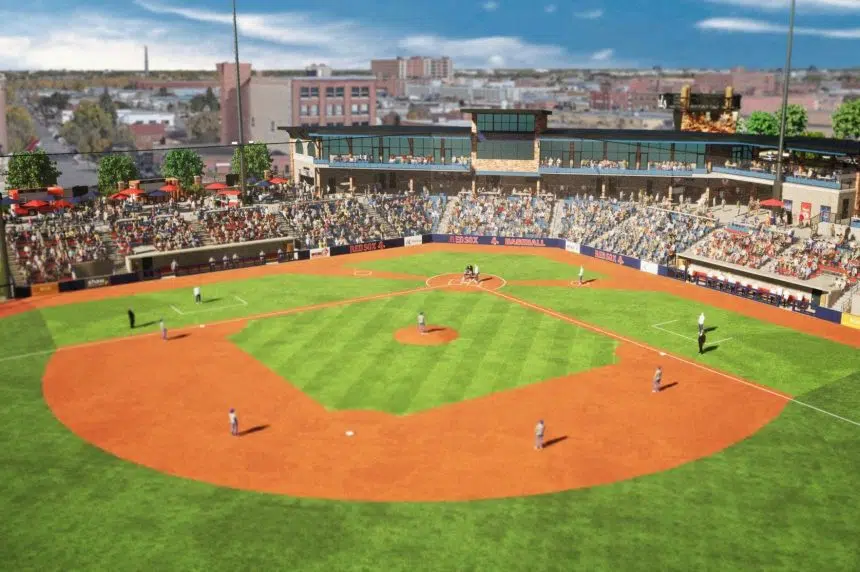The city’s executive committee balked at the idea of getting involved in a new stadium for the Regina Red Sox during its meeting on Wednesday.
The Red Sox, who play in the Western Canadian Baseball League, had approached the city along with Living Sky Sports and Entertainment. Together, they hoped the city would enter into a letter of intent (LOI) affirming their shared pursuit of the project.
The executive committee was asked to recommend that council approve up to $100,000 for the city’s share of the exploratory work, which could include tasks like a needs assessment, economic impact assessment and concept plans, among others.
Instead, members voted 7-3 in favour of Coun. Bob Hawkins’ motion to deny the funding. Councillors Lori Bresciani, Terina Shaw and John Findura opposed the motion.
Hawkins gave several reasons for withholding the money. But he said the most important one was the lack of public approval.
“Given that we’ve got a big stadium (Mosaic Stadium) that we’re worried about financing still, I can find no compelling community support, broad-based, for this project. It is entirely premature and I think it would be a mistake for the city to invest $100,000 in this,” Hawkins said.
He argued that as a private franchise, the Red Sox should approach Regina Exhibition Association Limited and see if it would find money to pursue the project.
Hawkins also pointed out an administration report that says baseball diamonds are not a high priority in the city’s recreation master plan. When it comes to high-performance ball diamonds, the plan recommends the city consider partnerships but not be the one leading the development.
“If they want a baseball stadium, they should find the $100,000 or whatever it takes to find a feasibility report and bring something to us that we can work with. But we shouldn’t be partnering in something as ephemeral as this right now. It’s just not the right time,” Hawkins said.
That suggestion didn’t sit well with Bernie Eiswirth, the team’s vice-president and general manager.
“That’s not feasible,” he said. “We could never afford to pay for a stadium.
“I don’t understand what they mean by that. Did the (Saskatchewan Roughriders) build their own stadium? Did the soccer community build their own soccer facility? Did the hockey community build the hockey rinks in Co-operators (Centre)?
“Every recreational facility in the city is built by the city. I don’t understand why baseball would be different.”
The Red Sox currently play at Currie Field, which dates back to 1968. Eiswirth said the facility doesn’t have the amenities seen in most baseball stadiums, including proper dressing rooms, concession areas and a grandstand.
He used the word “dilapidated” to describe Currie Field.
“The place is a dump and it needs to be replaced and I’d love to know what the city’s plan is to deal with it,” Eiswirth said. “That’s why we put a plan forward — and I guess they don’t like that plan because they wouldn’t even consider doing exploratory research to see if the plan is viable or not.”
He added the Red Sox are a community-based, amateur team that doesn’t have the financial resources to fund a new stadium nor the experience to operate it.
“That’s not our job,” he said. “Our job is to run a baseball team … We’re not in the business of building stadiums.”
The team unveiled its plans for a new home in April, planting its flag in downtown Regina in the railyards.
Bresciani could picture the stadium revitalizing the area.
“It could be surrounded by obviously … stores which would animate and bring (the area) to life. It could even be condos and living around that area,” Bresciani said. “It doesn’t matter where it goes but I do think it does draw people.”
On the other hand, Coun. Andrew Stevens was more skeptical.
“These stadiums don’t have a return on investment. Otherwise, the private sector would be building them. They don’t,” Stevens said.
“There’s a reason why rich people keep money in their pockets and spend the public’s money on these big stadiums. It’s because there’s no money in it.”
The city’s recreation master plan ranks aquatics centres as its top priority for indoor amenities, while ball diamonds are listed 17th for outdoor amenities. That is the exploratory work the city has already done, Stevens said.
Estimates for the cost of building the stadium start at $20 million and Hawkins was worried about overruns as more and more studies are required.
“We’re going to be in so far that we can’t get out,” he said.
Eiswirth noted the stadium wouldn’t be used only by the Red Sox, but by other baseball teams in the city — just as facilities in other WCBL centres like Okotoks play host to amateur baseball in their cities.
While the Red Sox were rebuffed Wednesday, Eiswirth said the executive committee’s decision “doesn’t completely make it the end of (the stadium proposal).” But the team’s directors will have to meet to determine their next step.
“In the meantime, we’re going to put a team together for the 2022 season,” said Eiswirth, whose organization isn’t playing in 2021 due to COVID-19.
“That’s the other thing I’m kind of worried about is that if we don’t get a different place to play in the next few years, we may not have a team anymore. We’re at a big financial disadvantage with the Alberta franchises because they have big stadiums.”











